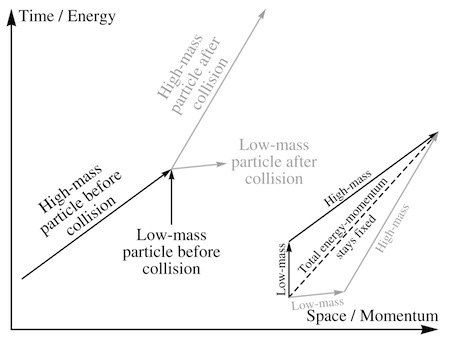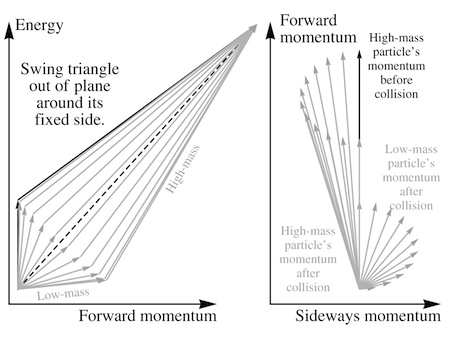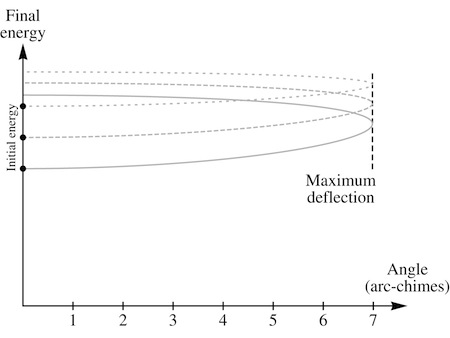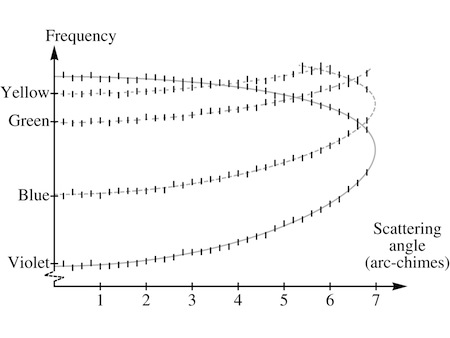The Eternal Flame (11 page)
Authors: Greg Egan
Tags: #Science Fiction, #General, #Space Opera, #Fiction

Ulfa paused to dust her chest with dye and press a sheet of paper to her skin. Then she addressed Tamara. “Do you think that’s feasible?”
“It will be difficult,” Tamara admitted. “Each beacon will only be visible once a bell, so if we’re going to have to nudge the Object repeatedly and check its motion each time, it will be a slow process. We could be there for as long as a couple of stints.”
“So you’ll need more cooling air, more food,” Ulfa said. “What’s that going to do to your flight plan?”
“The mass of any extra food would be negligible,” Tamara said, resisting a joke about the proportion of women on the crew. “But it might be worth making allowances to bring more cooling air. Hyperthermia is a horrible way to go.”
Massima said, “Forgive me for interrupting.”
At the sound of her voice everyone turned to face her. In all the planning meetings she’d attended, she’d barely spoken a word.
Tamara tried to counter the alarm she’d inadvertently created. “I only meant that we needed to be sure of our air supplies. I promise you, we won’t be taking any foolish risks—”
Massima raised a hand to silence her. “I accept that. But the truth is, I have no expertise to contribute to this task, so why should I be there with you, using up precious air? It was generous of you to offer a place on the
Gnat
to an onlooker. This could have been the experience of a lifetime, the perfect story to leave to my children. But in all conscience, after what I’ve heard these last few stints I can’t take that role any more. I wish you luck, but I’ll have to hear about the journey upon your return.”
Tamara didn’t know how to respond. Imploring the woman to reconsider would only embarrass her.
Ada said, “I respect your decision, Massima. And I’ll be happy to tell you everything as soon as we get back.”
As Massima left the chamber, Tamara wondered if the Council would insist that they draw another name from the lottery entrants. If not, they’d have a chance to bring another crew member. If it was prudent to appoint two navigators, why not a second chemist in case something befell the first?
Ivo went on to describe the machinery he wished to commission from the instrument builders, to equip the
Gnat
with hands of air should it need them. Ulfa quibbled over some details, but eventually agreed that he could take his sketches to Marzio and have prototypes made.
When the meeting was over, Tamara caught up with Ada in the corridor.
“I can’t believe I frightened off our passenger,” Tamara lamented.
“It’s not your fault,” Ada replied. “She made her own judgment.”
“So how’s your co taking this?” Tamara asked her.
“He’s a little jealous,” Ada admitted. “But he’ll survive.”
“He’s not worried about you?”
Ada thought for a while as they dragged themselves along the ropes. “Maybe he is. But he knows I won’t get another chance like this. I mean, I’m not going to be guiding the
Peerless
home, am I? And I’m never going to spot anything in the sky that really matters.”
Tamara buzzed admonishingly. “You have more years as an observer ahead of you than I do!”
“Maybe. But what could surpass the Object?”
“Something that surprises us completely,” Tamara suggested. “We’ve barely started making use of infrared.”
“At the launch of the
Peerless
,” Ada mused, “everyone must have felt some pride to be bearing the world on their shoulders. And if we ever return, I expect the whole generation who make it back will be treated like heroes. But when you’ve been born into this mess halfway, with no say in it, what can you do? If you’re vain enough you could spend your life imagining you’re going to discover the Eternal Flame. As for the rest of us… we get to starve ourselves as best we can, make some tiny contribution to the Great Project, and try to remain contented while we pass the time until we have children.”
Tamara thought that was putting it rather bleakly. “Except for the starving, would things have been so different if we’d been born back home, before the Hurtlers?”
Ada tipped her head, conceding the point. “The big cities had many more people than the
Peerless
, but how many people can you meet in a lifetime? And if I was traveling from town to town by truck or train, instead of reveling in my freedom I might have spent the journey gazing up at the sky, wishing I could go flying in a rocket instead.”
“And you’ll be traveling from town to town soon enough,” Tamara joked. The Object was unlikely to be populated, but the latest measurements suggested that it was comparable in size to the
Peerless
. “You have the best of both worlds.”
“I know!” Ada said. “Believe me, I realize how lucky I am. Not only will I escape this prison for a while, the journey might even turn out to be useful. Addo understands that, which is why he’d never ask me to give it up.”
Tamara was silent. They’d reached the junction where they’d have to go their separate ways.
Ada said, “So your co’s not the same?”
“I’m working on it,” Tamara said. “Right now all he can see is the danger, but I’m sure I’ll bring him round in the end.”
12
C
arla was reaching behind the textbooks for her stash of groundnuts when she heard someone moving on the ropes near the entrance to the classroom. She closed the cupboard quickly, embarrassed. She should have been strong enough to deal with her hunger without playing these stupid games.
Patrizia appeared in the doorway. “Do you have a moment, Carla? I need to ask you about something.”
“Of course.” Carla’s gut was squirming, cheated of the imaginary meal she’d promised it, but she kept her voice even and her face composed.
Patrizia dragged herself to the front of the room. “I know I made a fool of myself, with what I said about the tarnishing,” she began.
“That’s not true,” Carla insisted. “I asked for wild ideas, and you were brave enough to offer one. Just because it didn’t hold up doesn’t make you foolish.”
“Well, I’ve had another wild idea,” Patrizia admitted. “But this time, I was wondering if you’d hear it in private.”
“Of course.”
“I hope I’m not wasting your time,” Patrizia said. “Sometimes it’s so hard to concentrate that I start making stupid mistakes. Things I ought to know just… go into hiding.”
The misery in that last phrase was painful to hear, but Carla didn’t know what she could do about it. It wasn’t her place to tell the poor girl to put off the famine for another year or two—trading the risk that she’d face a much more arduous struggle, later, for a little more youthful energy and clarity when she really needed it.
“We all make mistakes,” she said. “Tell me your idea, I’ll be happy to hear it.”
Patrizia began haltingly. “The first part is just elementary mechanics, really. But I wanted to check it with you before I go any further.”
Carla did her best to hide her dismay. She’d been thinking of the groundnuts all through the lesson, but if she could survive her cravings for a whole bell she could remain polite for another few lapses.
She said, “Go ahead.”
“Suppose you have a motionless particle, and it’s struck by another particle that’s about three times as heavy,” Patrizia said. “I
think
their energy-momentum vectors before and after the collision would be something like this:”

“That looks fine to me,” Carla replied. The first diagram portrayed the history of the collision, while the second repositioned the same four vectors to make the geometrical rules that governed them visible at a glance. “You’re just using the triangle law, right? The sum of the two energy-momentum vectors has to be conserved, and their individual lengths are just the masses of the particles, which don’t change. So the vectors will form two sides of a triangle whose shape is left unchanged by the collision, and whose third side—the total energy-momentum—remains fixed.”
Patrizia seemed relieved, but still far from confident. “And
all
the possibilities for a collision like this can be found by rotating that triangle around its third side?”
“Yes.”
“That will give you the off-axis collisions as well? You just swing the triangle out…?” She sketched some examples, showing what happened to the particles’ momenta if they glanced off each other during the impact, scattering to either side of the original axis, bringing in another dimension of space.

“That’s all correct,” Carla assured her, letting a hint of impatience into her voice. Wherever Patrizia was taking this, she had the basics right, she could move on.
Patrizia said, “On the same assumptions, I calculated the final energy for the heavy particle, for a few different starting energies.” She opened a pocket, pulled out a sheet of paper and unrolled it.

Carla hesitated now. Though she’d surely made a similar plot once herself—as part of some long-forgotten exercise when she’d first been studying mechanics—this had gone past the obvious-at-a-glance stage. “The angle here is measuring how far the heavier particle ends up off-axis?” she asked.
“Yes,” Patrizia said. “The details of the collision itself—whether it’s glancing or head-on—would determine that angle, but I’m just trying to be clear about the final outcome, about the possible combinations of angles and energies allowed by the conservation laws. The really striking thing about these curves is the way the greatest angle of deflection always turns out the same! So long as the lighter particle starts off at rest, there’s a maximum angle at which the heavier particle can end up being knocked off course, and it only depends on the ratio of the masses—the energy of the collision doesn’t come into it.”
“Hmm.” Carla couldn’t recall ever being aware of that result, and she couldn’t see any simple geometrical reason why it had to be true, so she worked through the algebra on her chest. The claim turned out to be perfectly correct: the maximum angle of deflection was the same, regardless of the energy.
Carla’s impatience was tempered by curiosity now. Was Patrizia going to try to rescue her tarnishing theory by adding a second luxagen, three times heavier than the first?
Patrizia said, “I can put curves with exactly the same form as this through the data we measured in the light scattering experiment.” She dug out a second plot.
